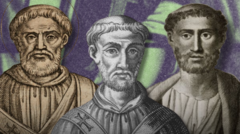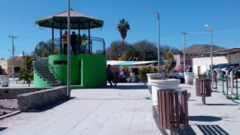Three historical African popes played pivotal roles in shaping Christian practices, including the establishment of Easter and Valentine's Day. As the Church anticipates a successor to Pope Francis, the potential for an African pope may signal a new chapter in Catholicism.**
The Legacy of African Papacy and Its Influence on Modern Christianity**

The Legacy of African Papacy and Its Influence on Modern Christianity**
Exploring the contributions of North African popes to Christianity and the potential for a new papal era.**
In the rich tapestry of Christian history, North Africa once stood as a vibrant center of faith, giving rise to several significant popes whose legacies continue to influence the Church today. Despite its modern-day identification as predominantly Muslim, North Africa was a vital bastion of early Christianity, fostering leaders who shaped the religion during the Roman Empire’s vast reach over the region, encompassing present-day Tunisia, northeastern Algeria, and western Libya.
Historian Prof. Christopher Bellitto of Kean University reflects on North Africa's historical significance, referring to it as the "Bible Belt of ancient Christianity". As the Catholic Church approaches the selection of a new pope following Pope Francis, many believe it could result in the first return of the papacy to Africa in 1,500 years. This article revisits three African popes who enacted pivotal changes within the Church, including the setting of Easter Sunday and the commemoration of St. Valentine's Day.
**Pope Victor I (189-199)**, likely of Berber descent, presided over an era marked by Christian persecution within the Roman Empire. He is renowned for advocating the uniform celebration of Easter on a Sunday, resolving the contentious "Easter controversy" through the first Roman Synod. This crucial decision aimed to unify Easter observance across the empire by excommunicating non-compliance bishops. Additionally, Victor I made a significant shift by introducing Latin as the liturgical language of the Church, moving away from Greek.
**Pope Miltiades (AD311-314)**, believed to have been born in Africa, reigned during a time of increasing acceptance of Christianity under Roman emperors. Though he did not pioneer this shift, his papacy was marked by the establishment of the first papal residence, courtesy of Emperor Constantine, and he oversaw the foundation of the Lateran Basilica, often referred to as "the mother of all churches."
**Pope Gelasius I (AD492-496)** is regarded as one of the most important figures among the African papacy. He is noted for being the first to adopt the title "Vicar of Christ", emphasizing the Church’s role as a divine authority. Gelasius's Doctrine of the Two Swords established a framework for the relationship between Church and state, further asserting the Church’s moral supremacy. The institution of St. Valentine's Day on February 14, 496, to honor the Christian martyr St. Valentine also stemmed from Gelasius’s desire to root Christian traditions within pagan festivities like Lupercalia.
Despite the rich contributions of these early popes, the Church has not seen an African leader in the papacy since Gelasius I. According to Prof. Mwaura of Kenyatta University, this absence correlates with the decline of the Church’s influence in North Africa due to various historical factors, including the ascent of Islam and the fall of the Roman Empire. The papal selection processes historically turned into an "Italian monopoly," further restricting chances for an African pope.
However, the demographics are shifting, with Catholicism in sub-Saharan Africa experiencing rapid growth, currently comprising 20% of the global Catholic population. Among the potential candidates to succeed Pope Francis are three renowned African clergy, including Fridolin Ambongo Besungu from the Democratic Republic of Congo, Peter Kodwo Appiah Turkson from Ghana, and Robert Sarah from Guinea. Experts suggest that as the Church dynamics evolve, Africa could witness its first modern pope, reshaping the future of Catholicism to reflect its diverse and vibrant constituency.
Historian Prof. Christopher Bellitto of Kean University reflects on North Africa's historical significance, referring to it as the "Bible Belt of ancient Christianity". As the Catholic Church approaches the selection of a new pope following Pope Francis, many believe it could result in the first return of the papacy to Africa in 1,500 years. This article revisits three African popes who enacted pivotal changes within the Church, including the setting of Easter Sunday and the commemoration of St. Valentine's Day.
**Pope Victor I (189-199)**, likely of Berber descent, presided over an era marked by Christian persecution within the Roman Empire. He is renowned for advocating the uniform celebration of Easter on a Sunday, resolving the contentious "Easter controversy" through the first Roman Synod. This crucial decision aimed to unify Easter observance across the empire by excommunicating non-compliance bishops. Additionally, Victor I made a significant shift by introducing Latin as the liturgical language of the Church, moving away from Greek.
**Pope Miltiades (AD311-314)**, believed to have been born in Africa, reigned during a time of increasing acceptance of Christianity under Roman emperors. Though he did not pioneer this shift, his papacy was marked by the establishment of the first papal residence, courtesy of Emperor Constantine, and he oversaw the foundation of the Lateran Basilica, often referred to as "the mother of all churches."
**Pope Gelasius I (AD492-496)** is regarded as one of the most important figures among the African papacy. He is noted for being the first to adopt the title "Vicar of Christ", emphasizing the Church’s role as a divine authority. Gelasius's Doctrine of the Two Swords established a framework for the relationship between Church and state, further asserting the Church’s moral supremacy. The institution of St. Valentine's Day on February 14, 496, to honor the Christian martyr St. Valentine also stemmed from Gelasius’s desire to root Christian traditions within pagan festivities like Lupercalia.
Despite the rich contributions of these early popes, the Church has not seen an African leader in the papacy since Gelasius I. According to Prof. Mwaura of Kenyatta University, this absence correlates with the decline of the Church’s influence in North Africa due to various historical factors, including the ascent of Islam and the fall of the Roman Empire. The papal selection processes historically turned into an "Italian monopoly," further restricting chances for an African pope.
However, the demographics are shifting, with Catholicism in sub-Saharan Africa experiencing rapid growth, currently comprising 20% of the global Catholic population. Among the potential candidates to succeed Pope Francis are three renowned African clergy, including Fridolin Ambongo Besungu from the Democratic Republic of Congo, Peter Kodwo Appiah Turkson from Ghana, and Robert Sarah from Guinea. Experts suggest that as the Church dynamics evolve, Africa could witness its first modern pope, reshaping the future of Catholicism to reflect its diverse and vibrant constituency.





















